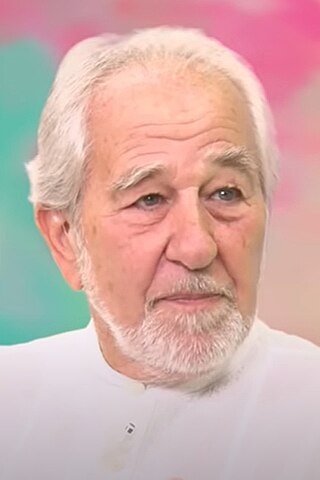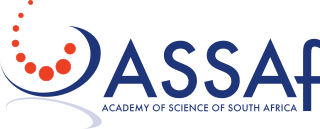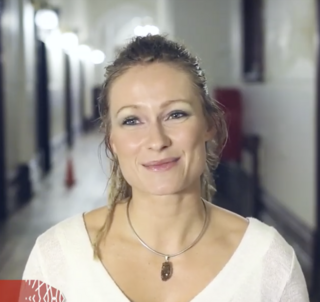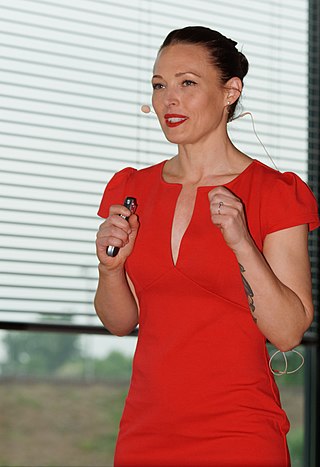Related Research Articles

Quackery, often synonymous with health fraud, is the promotion of fraudulent or ignorant medical practices. A quack is a "fraudulent or ignorant pretender to medical skill" or "a person who pretends, professionally or publicly, to have skill, knowledge, qualification or credentials they do not possess; a charlatan or snake oil salesman". The term quack is a clipped form of the archaic term quacksalver, from Dutch: kwakzalver a "hawker of salve". In the Middle Ages the term quack meant "shouting". The quacksalvers sold their wares at markets by shouting to gain attention.

Stellenbosch University is a public research university situated in Stellenbosch, a town in the Western Cape province of South Africa. Stellenbosch is the oldest university in South Africa and the oldest extant university in Sub-Saharan Africa, together with the University of Cape Town - which received full university status on the same day in 1918. Stellenbosch University designed and manufactured Africa's first microsatellite, SUNSAT, launched in 1999.
George Claassen is a South African journalist who was the head of department of journalism at Pretoria Technikon and Stellenbosch University. Claassen was the first academic in the field of journalism to develop a course in science and technology journalism and can rightly be called the "father of science communication in Africa"

Siddha medicine is a form of traditional medicine originating in southern India. It is one of the oldest systems of medicine in India.
Functional medicine (FM) is a form of alternative medicine that encompasses a number of unproven and disproven methods and treatments. It has been described as pseudoscience, quackery, and at its essence a rebranding of complementary and alternative medicine. In the United States, FM practices have been ruled ineligible for course credits by the American Academy of Family Physicians because of concerns they may be harmful.

Bruce Harold Lipton is an American writer and lecturer whose work has been dismissed by some peers as pseudoscience. By his own admission, Lipton's ideas have not received attention from mainstream science. Lipton has not published original scientific research in a peer-reviewed medical journal in 30 years.

The Academy of Science of South Africa (ASSAf) is the national science academy in South Africa. It was started in 1996, and encompasses all fields of scientific work. Its legal foundation is the Academy of Science of South Africa Act, Act 67 of 2001, which came into operation in May 2002.
The Conversation is a network of nonprofit media outlets publishing news stories and research reports online, with accompanying expert opinion and analysis. Articles are written by academics and researchers under a Creative Commons license, allowing reuse without modification. Copyright terms for images are generally listed in the image caption and attribution. Its model has been described as explanatory journalism. Except in "exceptional circumstances", it only publishes articles by "academics employed by, or otherwise formally connected to, accredited institutions, including universities and accredited research bodies".
Nicoli Nattrass is a South African development economist who is professor of economics at the University of Cape Town (UCT). She is the co-director of the Institute for Communities and Wildlife in Africa (iCWild) and was the founding director of the Centre for Social Science Research (CSSR).
Johann Reinder Erlers Lutjeharms, was a leading South African marine scientist and an authority in the oceanography of the Agulhas Current, who authored a definitive work on the subject, The Agulhas Current. His main field of investigation was the large-scale circulation patterns of the oceans adjacent to southern Africa and their influence on weather and climate, and he participated in 17 research cruises and was responsible for a further 48 projects undertaken on such cruises.

The Magaliesberg Biosphere Reserve is located in South Africa between the cities of Pretoria and Johannesburg to the east and Rustenburg to the west. The reserve lies at the interface of two great African biomes — the Central Grassland Plateaux and the sub-Saharan savannah — and the remnants of a third biome, the Afro‐montane forest. The rich biodiversity includes floral species such as Aloe peglerae and Frithia pulchra, and faunal species such as the forest shrew, sable antelope and 443 bird species representing 46.6% of total bird species in the southern African sub-region.
Sarah Wild is a South African science journalist and author. In November 2017 she became the first African to win a AAAS Kavli Science Journalism Award.
Open access to scholarly communication in South Africa occurs online via journals, repositories, and a variety of other tools and platforms. Compared to other African nations, open access in South Africa has grown quickly in recent years.
The National Science and Technology Forum (NSTF) is a non-profit company representing South African organisations in the public and private sector with an interest in science, engineering, technology, and innovation. Its aim is to promote science, engineering, and technology, and to engage with related government policies. Established in 1995, the NSTF organizes annual awards for research and development excellence in South Africa.
Nokwanda Pearl (Nox) Makunga is a Professor of Biotechnology at Stellenbosch University.

Adriana Marais is a South African theoretical physicist, technologist and advocate for off-world exploration. She is a director of the Foundation for Space Development Africa, an organisation aiming to send Africa's first mission to the Moon, the Africa2Moon Project. She is the founder of Proudly Human, an initiative of which is the Off-World Project, a series of habitation experiments in Earth's most extreme environments.

Anna Zakrisson is a Swedish science communicator and scientist living in Berlin.
Sarah Fawcett is a South African oceanographer and climatologist. A senior lecturer in the Department of Oceanography at the University of Cape Town, she is particularly interested in the role of oceans in regulating biogeochemical cycles and how their dysregulation contributes to climate change. She was honoured in the World Economic Forum Young Scientists Class of 2020, and a P-Rating from the National Research Foundation, which recognizes that the scientist's work will likely have high impact.
Professor Michael John Wingfield is a South African academic and scientist who studies plant pathology and biological control. He was the founding director of the Forestry and Agricultural Biotechnology Institute, University of Pretoria. Wingfield has authored or co-authored over 1,000 scientific publications and is considered a leading expert in the field of forest health and invasive species. He has received numerous awards and honours throughout his career, including Harry Oppenheimer Fellowship Award and John Herschel Medal, the highest accolade from the Royal Society of South Africa. He is also a Fellow of the Royal Society of South Africa and the African Academy of Sciences. Wingfield has had several fungi named after him.
The South African Research Chairs Initiative (SARChI) establishes prestigious research chairs in South African universities with the support of funding from the National Research Foundation (NRF). The programme, launched in 2006 as a joint initiative between the NRF and the national Department of Science and Innovation (DSI), aims to attract and retain excellent researchers in South African public institutions. The research chairs are reserved for established researchers and are renewable for up to 15 years.
References
- 1 2 3 4 "Mail & Guardian". Marina Joubert. Archived from the original on 14 November 2019. Retrieved 14 November 2019.
- 1 2 3 "PCST Life Members". PCST Network. 1 February 2019. Retrieved 14 November 2019.
- 1 2 "Marina Joubert Archives » SciBraai". SciBraai. 29 January 2014. Retrieved 14 November 2019.
- 1 2 3 4 5 "Catherina Magdelena (Marina) Joubert" (PDF). sun.ac.za. Stellenbosch University. June 2019. Retrieved 14 November 2019.
- ↑ "Ms.Marina Joubert". SAASTA – South African Agency for Science and Technology Advancement (SAASTA). Retrieved 14 November 2019.
- ↑ "Science Communication Training". Jive Media Africa. 24 June 2014. Retrieved 14 November 2019.
- ↑ "International summit on quackery and pseudoscience". EurekAlert!. 25 October 2017. Retrieved 14 November 2019.
- ↑ International Summit on Quackery & Pseudoscience - Dr Marina Joubert on YouTube
- ↑ Joubert, Marina; Guenther, Lars (29 November 2017). "In the footsteps of Einstein, Sagan and Barnard: Identifying South Africa's most visible scientists". South African Journal of Science. 113 (11/12). Academy of Science of South Africa: 9. doi: 10.17159/sajs.2017/20170033 . ISSN 1996-7489.
- ↑ Education, Inside (2 December 2017). "Who and where are the visible scientists in South Africa?". Inside Education Inspiring Minds. Retrieved 14 November 2019.
- ↑ Tswanya, Yolisa (3 December 2018). "Researchers in bid to understand reason for anti-vaccination drive". MSN. Retrieved 14 November 2019.
- ↑ Marina Joubert (27 July 2019). How Anti Vaccination beliefs go viral (Podcast). Life Podcasts: Cape Talk. Retrieved 14 November 2019.